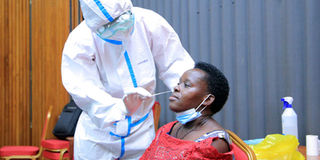Covid-19 community infections: Where did ministry go wrong?

Kibale Woman Member of Parliament (MP) Noeline Kisembo during the screening process of Covid-19 at Parliament. PHOTO BY DAVID LUBOWA
What you need to know:
- Patient under critical care. The management of Rubaga Hospital in Kampala yesterday said one of the patients who was in their Intensive Care Unit was confirmed to be infected with Covid-19.
With two people dead and one patient under critical care, the country is experiencing a drastic rise in Covid-19 community infections.
The assessment of data from the Health ministry by this reporter, found that as of May 6, the country had a total of 100 infections and of whom, only eight patients (8 per cent) were resulting from local transmission.
However, the latest Covid-19 situation report released by the Health ministry on July 26, shows that up to 42 per cent (423 cases) of the cumulative national total (1,147) of Covid-19 cases are resulting from local transmission.
The Health ministry says the community cases have been reported in 40 districts so far, but Amuru and Kyotera districts are some of the most affected in addition to rising cases in Kampala, among the army and refugees.
Experts link the increasing cases in the community to laxity among members of the public, poor hygiene practices and the onset of the political season.
Dr Henry Kajumbula, the head of Covid-19 prevention and control in the team of scientists, said most Ugandans have not taken the pandemic with required seriousness.
“Many people are not taking their lives seriously. Covid-19 may not kill someone else but may kill you,” he said during the televised Ministry of Health update to the nation yesterday.
“There has been lots of laxity among members of the public. When people in my community see me wearing a face mask think I am joking,” he added.
A number of people say wearing a mask is inconveniencing and gives them difficulties in seeing and breathing.
“There might be a lot of inconvenience when you start wearing the masks but it takes a short time and you become used to it,” Dr Kajumbula said.
During the national update, the experts decried actions of leaders, who are being sighted conducting political activities without observing prevention measures such as social distancing and wearing face masks.
Dr Misaki Wayengera, who heads a team of scientists advising government on Covid-19, cautioned the political leaders against misleading the public, saying “we lead people who are alive not dead.”
“We caution and urge political parties and their leadership to comply with prevention measures. They should come up with their own task forces [to respond to Covid-19 pandemic],” he said. Dr Wayengera said if people do not reverse, the country will be badly affected by the pandemic because of the wanting capacity of the health system.
“We are not yet at the worst stage but we are getting there. The capacity we have can only manage a few number of cases,” he added.
Dr Joyce Moriku Kaducu, the State minister for Primary Healthcare, however, said the adherence of people to measures is also affected by cultural practices and religious beliefs.
Dr Kaducu said most Africans struggle with maintaining sanitation and hygiene.
“As Africans we are not used to that restricted life. And now you are bringing the new idea of wearing a facemask. This has a lot to do with changing the mindset of people and so it is going to be a gradual process,” she told Daily Monitor previously.
Rapid assessment
Dr Jane Ruth Aceng, the Health minister, during the update said the fact that the two people, who succumbed to Covid-19 got infected from sources that are unknown, makes rapid assessment of community infections a very urgent need.
Last week on Wednesday, the minister flagged off 18 teams of researchers that will assess the extent of local transmission of Covid-19 in the country, an exercise that will be done along with Makerere University.
The assessment, which targets border districts, Uganda Revenue Authority (URA) workers, sex workers, health workers, boda boda and taxi drivers, among others, intends to assess at least 13,314 Ugandans.
“In April, we conducted rapid assessment survey that detected sporadic cases. Uganda experienced a transition from sporadic to clusters of infections and to community transmission,” Dr Aceng said.
Management
Patient under critical care. The management of Rubaga Hospital in Kampala yesterday said one of the patients who was in their Intensive Care Unit was confirmed to be infected with Covid-19.
“Rubaga Hospital wishes to inform the general public that following the confirmation of the Covid-19 case in the hospital Intensive Care Unit, we have gotten in touch with the patient’s family to offer social support and begin the process of contact tracing,” Dr Andrew Ssekitooleko, the hospital executive director, said in a press statement.




